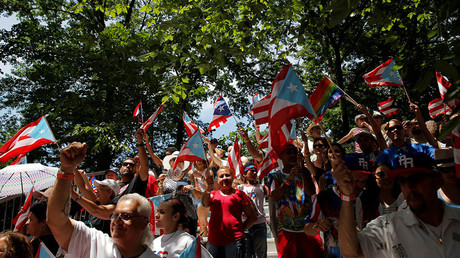Puerto Rico’s governor announced the US territory has overwhelmingly chosen statehood in a non-binding referendum on Sunday held amid a deep economic crisis that has sparked an exodus of islanders to the US mainland.
“From today going forward, the federal government will no longer be able to ignore the voice of the majority of the American citizens in Puerto Rico,” Governor Ricardo Rossello said, announcing the victory.
“It would be highly contradictory for Washington to demand democracy in other parts of the world, and not respond to the legitimate right to self-determination that was exercised today in the American territory of Puerto Rico.”
US Congress, however, has final say in any changes to the island’s political status.
Nearly half a million votes were cast for statehood, more than 7,600 for free association/independence, and nearly 6,700 for the current territorial status.
The participation rate was just 23 percent with roughly 2.26 million registered voters, leading opponents to question the validity of a vote that several parties had boycotted.
It was the lowest level of participation in any election in Puerto Rico since 1967, according to Carlos Vargas Ramos, an associate with the Center for Puerto Rican Studies at Hunter College in New York.
Puerto Rico’s main opposition party rejected the pro-statehood result.
“The scant participation … sends a clear message,” said Anibal Jose Torres, a party member. “The people rejected it by boycotting an inconsequential event.”
Rossello, however, vowed to push ahead with his administration’s quest for statehood, which was his top campaign promise.
“In any democracy, the expressed will of the majority that participates in the electoral processes always prevails,” he said. “Puerto Rico voted for statehood.”
Among those hoping Puerto Rico will become a state is Jose Alvarez, a 61-year-old businessman.
“Now is the moment to do it,” he said. “We’ve spent a lot of years working on a socioeconomic model that has not necessarily given us the answer.”
Many believe the island’s territorial status has contributed to its 10-year economic recession, which has prompted nearly half a million Puerto Ricans to flee to the US mainland, and was largely sparked by decades of heavy borrowing and the elimination of federal tax incentives.
Maria Quinones, 66, said she voted for the first time in such a referendum, the fifth on Puerto Rico’s status.
“We have to vote because things are not going well,” she said. “If we were a state, we would have the same rights.”

Leave a comment
You must be logged in to post a comment.